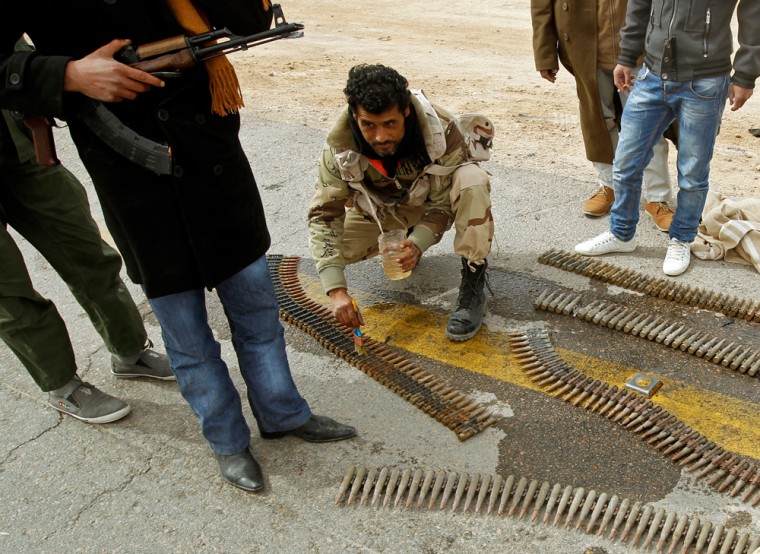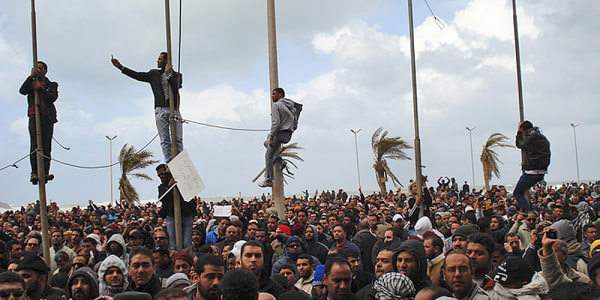Libya's army told residents in Benghazi on Tuesday that it will come on what it called a "humanitarian mission" to save them from rebels controlling the eastern city in defiance of Muammar Gadhafi's 41-year rule.
In an announcement carried by state-run television, the army also urged Benghazi residents to not allow their children to join the rebels it described as "terrorists."
Gaddafi's forces seized the strategic town of Ajdabiyah on Tuesday, opening the way to the rebel stronghold of Benghazi.
The announcement followed the army's claim it has retaken the strategic eastern town of Adjabiyah, where rebels flying a MiG 23 warplane and a helicopter said they sank two pro-Gadhafi warships.
The Brnieq online newspaper quoted an unnamed air force officer at the Benina airbase in Benghazi as saying the two aircraft also bombed an unspecified number of tanks near Brega and Ajdabiya.
Those two towns fell to Gadhafi troops on Tuesday as his army advanced eastward toward Benghazi.
It was not clear where the two aircraft took off from. The airbase at Benghazi switched to rebel control when the opposition took charge of the city and several air force officers have been among military men who joined the opposition.
But as tanks rolled into the city from two directions and rockets relentlessly pounded houses and shops, the ragtag opposition fighters' defenses appeared to break down. Some lashed out at the West for failing to come to their aid with a no-fly zone.
"This is a mad man, a butcher," one rebel fighter said of Gadhafi, speaking to The Associated Press by telephone as explosions were heard in the background. "It's indiscriminate fire."
"The world is sleeping," he said. "They (the West) drunk of Gadhafi's oil and now they won't stand against him. They didn't give us a no-fly zone."
Residents of the city of 140,000 streamed out, fleeing toward Benghazi, 140 miles (200 kilometers) to the northeast. But warplanes and artillery were striking roads in and out of Ajdabiya, several witnesses and fighters said. Gadhafi forces cleared rebels out of of Ajdabiya Tuesday after heavy bombardment by warplanes and artillery, Libyan state TV reported.
"The town of Ajdabiya has been cleansed of mercenaries and terrorists linked to the al-Qaida organization," the report said, referring to the insurgents seeking to end Gadhafi's 41-year-old rule.
No-fly zone considered
The advancement came as Group of Eight powers meeting in Paris failed on Tuesday to agree on a no-fly zone over Libya, but a draft resolution in favor of an enforcement action circulated at the United Nations Security Council.
The draft, seen by Reuters, would authorize "all necessary measures to enforce" a ban on all flights, to protect civilians. The council "decides to authorize a ban on all flights in the airspace of (Libya) in order to help protect civilians."
After receiving the draft at a council meeting, members adjourned without taking action and were expected to reconvene on Wednesday. Some members of the 15-nation body have expressed doubts about whether a no-fly zone will work.
The U.N. Security Council is set to meet on Wednesday.
The G8 communique stated that Libyans had the right to democracy and that Gadhafi faced "dire consequences" if he ignored citizens' rights. It urged the U.N. Security Council to increase pressure on him, including via economic measures.
It stressed the importance of the Arab League's involvement in any action taken in the OPEC oil exporting nation.
Secretary of State Hillary Clinton said on Tuesday that the United States was looking at ways to support the Gadhafi opposition.
"We understand the urgency of this. And therefore we are upping our humanitarian assistance. We are looking for ways to support the opposition," said Clinton, speaking at a news conference during a visit to Cairo.
"But we believe that this must be an international effort and that there (have) to be decisions made in the (U.N.) Security Council in order for any of these steps to go forward," she said.
Gadhafi troops advance
The town of Ajdabiya was all that had stood between the relentless eastward advance of Libyan government troops and the second city of Benghazi and lies on a road junction from where Gadhafi's forces could attempt to encircle the rebel stronghold.
Libyan state television said pro-Gadhafi forces were now "in total control" of the town and a Reuters correspondent saw rebel forces pulling back.
Government jets opened up with rocket fire on the checkpoint at the western entrance to Ajdabiya, then unleashed an artillery bombardment on the position and a nearby arms dump, following the same pattern of attack that has pushed back rebels more than 100 miles in a week-long counter-offensive.
Slideshow 81 photos
Libya's uprising against Gadhafi
Battle lines in front of Ajdabiya and the oil port of Brega to the southwest have moved back and forth several times in three days of heavy fighting, but it was the first time rebels had abandoned the checkpoint in such numbers.
"They are bombarding the arms dump with land-based weapons. It is a really heavy bombardment," said civilian rebel supporter Ashraf Abdel Malik. "If they hit the arms cache it will destroy Ajdabiya."
One bomb destroyed a rebel camp, a panicked local activist told The Associated Press, and another wrecked a key rebel supply road. "This isn't one or two planes. They are like a flock!" he said, as explosions went off in the background.
He said Gadhafi's forces had also pounded the crucial eastern road that linked the city to other rebel strongholds. Residents were fleeing to nearby villages, he said.
As well as the coastal road to Benghazi, there is also a 250-mile desert road straight to Tobruk, near the Egyptian border that would cut off the second city. But it was not clear whether Gadhafi's forces were strong enough to be split and whether they could operate with such long supply lines.
Soliman Bouchuiguir, president of the Libyan League for Human Rights, said in Geneva that if Gadhafi's forces attacked Benghazi, there would be "a real bloodbath, a massacre like we saw in Rwanda".
The mood in the city was defiant but shaky.
At Gaddafi's evening rally, supporters chanted praise of the leader, who spoke for about half an hour in what appeared to be a preparation for a final reckoning with the rebellion. He said the rebels had brought shame upon themselves.
Mohamed Yasiri, unemployed and 55, said in Benghazi:
"About the news from Ajdabiyah, everyone admits now we don't have the weapons to take on Gaddafi.
"We are all afraid, to be honest."
Haitham Imami, 38, unemployed, listening to Yasiri, objected: "We are ready to fight him zenga, zenga (street by street). We have the weapons, even if we are left with daggers."
Gaddafi's planes, tanks and artillery have had few problems picking off lightly armed insurgents in the open desert, but have faced tougher resistance in towns that offer more cover.
Benghazi stronghold
U.N. Deputy High Commissioner for Human Rights Kyung-wha Kang said Gadhafi's government had "chosen to attack civilians with massive, indiscriminate force".
In Misrata, the last major city in western Libya still in rebel hands, residents said water had been cut off to the city of 300,000 people, 130 miles east of Tripoli.
"The situation is quiet but we expect everything at any moment," a resident called Mohammad told Reuters by telephone.
Pro-Gadhafi forces took control of the small town of Zwara, west of Tripoli, late on Monday after sending in tanks. A resident in Zwara said that on Tuesday security forces were trying to round up anyone suspected of links to the rebels.
"They have lists of names and are looking for the rebels. They also took a number of rebels as hostages," said the resident who did not want to be named.
Libyan state television said the people of Zwara "came out in mass demonstrations" in support of Gadhafi on Tuesday.
Government troops have scored victories using overpowering bombardments with artillery, tanks, warplanes and warships. Such an assault drove rebel fighters out of the western city of Zawiya last week.
The rebels' main stronghold, Benghazi, remained firmly in their hands on Tuesday. A Tuareg lieutenant from Mali who has fought for the Libyan government since 1993 said the government wants to retake Benghazi, but doesn't want to attack the city itself. He says the government will try to convince the residents of Benghazi to force militants out.
"The idea is to surround Benghazi but to leave one exit open for the rebels. If we can get the rebels to leave the city then we will move troops in between them and the city and fight them in the open desert."
Rights violations alleged
Rights groups have found evidence of serious rights abuses by Libya's security forces, including disappearances and deliberate killings of bystanders and protesters.
"We got information from Tripoli, by phone, skype, email, and from Libyans who left the country, and we've documented a wave of arrests and disappearances" in the west of the country, said Fred Abrahams, a special adviser to Human Rights Watch.
"If the crackdown in Tripoli is anything to go by, it's going to be very, very dark, especially if Benghazi falls (to Gadhafi's troops) because Benghazi has a tradition of anti-Gadhafi sentiment," he said on Tuesday.

